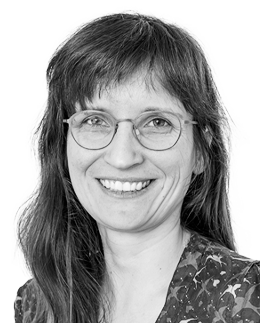Dr. Sophie Biesenbender studied politics and public administration at the universities of Konstanz and Bologna and public policy at Rutgers University, New Jersey. From 2008 to 2011 she was research assistant at the Robert Schuman Centre for Advanced Studies (European University Institute). After completing her dissertation in politics and public administration (2011) she was a postdoctoral researcher at Konstanz University. Sophie Biesenbender started to work at the DZHW (or its predecessor organisation iFQ - Institute for Research Information and Quality Assurance) in 2012. Since then, she has managed different projects with a focus on research information and research indicators. Between summer 2020 and spring 2022, she was acting head of department 2 (Research System and Science Dynamics). Since February 2022, she is head of office of the Commission for Research Information in Germany.

Dr. Sophie Biesenbender (geb. Schmitt)
Research Area Research System and Science Dynamics
Researcher
- +49 30 2064177-37
- Orcid
Projects
List of projects
Publications
List of publications
Entwicklung einer Klassifikation für interdisziplinäre Forschungsfelder im Rahmen des Kerndatensatz Forschung: Dokumentation des Projekts und der Projektergebnisse.Stiller, J., Trkulja, V., Biesenbender, S., & Petras, V. (2021).Entwicklung einer Klassifikation für interdisziplinäre Forschungsfelder im Rahmen des Kerndatensatz Forschung: Dokumentation des Projekts und der Projektergebnisse. Berlin: DZHW. |
Welches System für welchen Zweck? Abschluss der Reihe " Systemwahl " und Ausblick.Ebert, B., Tobias, R., & Biesenbender, S. (19. April 2021).Welches System für welchen Zweck? Abschluss der Reihe "Systemwahl" und Ausblick [Blogbeitrag]. https://doi.org/10.57689/DINI-BLOG.20210419 |
Investigating Assessment Standards in the Netherlands, Italy, and the United Kingdom: Challenges for Responsible Research Evaluation.Petersohn, S., Biesenbender, S., & Thiedig, C. (2020).Investigating Assessment Standards in the Netherlands, Italy, and the United Kingdom: Challenges for Responsible Research Evaluation. In Jakobs, K. (Hrsg.), Shaping the Future Through Standardization (S. 54-94). Hershey, PA: IGI Global. |
The effects of research policies on the management of research information in HEIs: evidence from Germany.Biesenbender, S., & Thiedig, C. (2019).The effects of research policies on the management of research information in HEIs: evidence from Germany. In Catalano, G., Daraio, C., Gregori, M., Moed, H. F., & Ruocco, G (Hrsg.) Proceedings of the 17th Conference of the International Society for Scientometrics and Informetrics (ISSI 2019), Vol. 2, (S. 2031-2036). Edizioni Efesto. ISBN 978-88-3381-118-5. |
The governance and standardization of research information in different science systems: a comparative analysis of Germany and Italy.Biesenbender, S. (2019).The governance and standardization of research information in different science systems: a comparative analysis of Germany and Italy. Higher Education Quarterly, 73(1), 116-127. https://doi.org/10.1111/hequ.12193 |
Support structures to facilitate the dissemination and implementation of a national standard for research information – the German case of the Research Core Dataset.Biesenbender, S., & Herwig, S. (2019).Support structures to facilitate the dissemination and implementation of a national standard for research information – the German case of the Research Core Dataset. Procedia Computer Science, 146, 131-141. https://doi.org/10.1016/j.procs.2019.01.088 |
Using Current Research Information Systems (CRIS) to showcase national and institutional research (potential): research information systems in the context of Open Science.Biesenbender, S., Petersohn, S., & Thiedig, C. (2019).Using Current Research Information Systems (CRIS) to showcase national and institutional research (potential): research information systems in the context of Open Science. Procedia Computer Science, 146, 142-155. https://doi.org/10.1016/j.procs.2019.01.089 |
Using Argumentation Visualization to Foster Transparency of Development Processes: An Evaluation Study.Riechert, M., Biesenbender, S., Becker, J., & Zarnekow, R. (2018).Using Argumentation Visualization to Foster Transparency of Development Processes: An Evaluation Study. Research Papers in Information Systems Management, Band 19, 1-30, Berlin: Universitätsverlag der TU Berlin. http://dx.doi.org/10.14279/depositonce-7147 |
Der Kerndatensatz Forschung als Instrument zur Kommunikation und Governance von Forschung.Biesenbender, S. (2018).Der Kerndatensatz Forschung als Instrument zur Kommunikation und Governance von Forschung. In M. Fuhrmann, J. Güdler, J. Kohler, P. Pohlenz & U. Schmidt (Hrsg.), Handbuch Qualität in Studium, Lehre und Forschung, 63 (S. 37-50). Berlin: DUZ Verlags- und Medienhaus. |
Developing and Standardising Definitions for Research Information: Framework and Methods of Successful Process Documentation.Riechert, M., Biesenbender, S., & Quix, C. (2017).Developing and Standardising Definitions for Research Information: Framework and Methods of Successful Process Documentation. Procedia Computer Science, 106, 260-267. |
The “Research Core Dataset” as a standard for research information: towards quality-assured and comparable data on research processes and outputs.Biesenbender, S. (2016).The “Research Core Dataset” as a standard for research information: towards quality-assured and comparable data on research processes and outputs. Online-Paper zum gleichnamigen Vortrag auf der OECD Blue Sky, 19.-21.09.2016, Ghent, Belgien. |
Developing definitions of research information metadata as a wicked problem? Characterisation and solution by Argumentation visualisation.Riechert, M., Biesenbender, S., Dees, W., & Sirtes, Daniel (2016).Developing definitions of research information metadata as a wicked problem? Characterisation and solution by Argumentation visualisation. Program, 50(3), 303-324. http://dx.doi.org/10.1108/PROG-01-2015-0009 |
The Research Core Dataset for the German science system: developing standards for an integrated management of research information.Biesenbender, S., & Hornbostel, S. (2016).The Research Core Dataset for the German science system: developing standards for an integrated management of research information. Scientometrics, 108(1), 401-412. |
The Research Core Dataset for the German science system: Challenges, processes and principles of a contested standardization project.Biesenbender, S., & Hornbostel, S. (2016).The Research Core Dataset for the German science system: Challenges, processes and principles of a contested standardization project. Scientometrics, 106(2), 837-847. |
Presentations
List of presentations & conferences
KDSF-Module als Standards für die Berichtslegung.Biesenbender, S. (2024, April).KDSF-Module als Standards für die Berichtslegung. Vortrag im Rahmen des Workshops mit Vertreter*innen aus Wissenschaftsministerien zum Thema Forschungsinformationen und -berichterstattung, Kommission für Forschungsinformationen in Deutschland (KFiD). |
Austausch mit Vertreter*innen aus Wissenschaftsministerien zum Thema Forschungsinformationen und -berichterstattung.Kommission für Forschungsinformationen in Deutschland, Petersohn, S., & Biesenbender, S. (2024).Workshop Austausch mit Vertreter*innen aus Wissenschaftsministerien zum Thema Forschungsinformationen und -berichterstattung, virtuell. |
Aktuelle Entwicklungen rund um den KDSF und die KFiD.Biesenbender, S., & Petersohn, S. (2024, April).Aktuelle Entwicklungen rund um den KDSF und die KFiD. Vortrag im Rahmen der Informationsveranstaltung zum KDSF-Standard für Forschungsinformationen in Deutschland, Geschäftsstelle der KFiD & Projektgruppe FIS Thüringer Hochschulen. |
Quality Measurement as a Prism - Research Evaluation of German Medical Faculties.Hartstein, J., & Biesenbender, S. (2023, Dezember).Quality Measurement as a Prism - Research Evaluation of German Medical Faculties. Vortrag auf der Konferenz (Re)designing quality indicators for higher education, HESPRI. |
Forschungsdaten-Publikationen und KDSF: Stand der Abbildung und Ausblick.Biesenbender, S. (2023, November).Forschungsdaten-Publikationen und KDSF: Stand der Abbildung und Ausblick. Vortrag im Rahmen des Online-Workshops "Monitoring von Forschungsdaten-Publikationen: Stand und Perspektive", Lehrstuhl Information Management am Institut für Bibliotheks- und Informationswissenschaft (IBI) der Humboldt-Universität zu Berlin, Helmholtz Open Science Office der Helmholtz-Gemeinschaft, Open-Access-Büro Berlin. https://doi.org/10.5281/zenodo.10245252 |
Der KDSF als wissenschaftsgeleiteter Standard für die Erfassung und Nutzung von Forschungsinformationen.Biesenbender, S. (2023, Oktober).Der KDSF als wissenschaftsgeleiteter Standard für die Erfassung und Nutzung von Forschungsinformationen. Vortrag im Rahmen des Leibniz-Führungskollegs "Reform der wissenschaftlichen Leistungsbewertung – Perspektiven und Chancen für die Leibniz-Gemeinschaft", Leibniz-Gemeinschaft, Berlin. |
Measuring research impact of authors on guideline work - a pilot analysis.Nothaker, M., Wenzel, G., Langer, T., Aman, V., Biesenbender, S., ... & Kopp, I. (2023, September).Measuring research impact of authors on guideline work - a pilot analysis. Vortrag im Rahmen der GIN 2023 Hybrid Conference "Maintaining quality while pursuing efficiency", Guidelines International Network (GIN), Glasgow, United Kingdom. Abstract
The evaluation of medical research performance is key for scientists’ careers. The Journal Impact Factor does not appropriately measure research impact. One contribution to a modified multidimensional evaluation system can be an author’s impact on guideline work. The objective of this contribution is to analyse the impact of medical scientists on clinical guidelines taking authors of oncological guidelines as example. |
Aktuelle Entwicklungen rund um den KDSF und die KFiD.Biesenbender, S. (2023, Juli).Aktuelle Entwicklungen rund um den KDSF und die KFiD. Vortrag im Rahmen der Vortragsreihe EVA Spezial online, bwUni.digital. https://doi.org/10.5281/zenodo.8120965 |
Aktuelle Entwicklungen rund um den KDSF und die KFiD.Biesenbender, S. (2023, Mai).Aktuelle Entwicklungen rund um den KDSF und die KFiD. Vortrag im Rahmen der Vernetzungstagung der Geschäftsstelle der KFiD und CRIS.NRW mit der HIS-RES-Community, Geschäftsstelle der KFiD und CRIS.NRW, Berlin. https://doi.org/10.5281/zenodo.7973788 |
Verarbeitung von Forschungsinformationen: Gesetzliche Grundlagen und Kontexte.Biesenbender, S. (2023, Mai).Verarbeitung von Forschungsinformationen: Gesetzliche Grundlagen und Kontexte. Vortrag im Rahmen des Leibniz-Workshops zum Thema "Datenschutz und CRIS", Leibniz-Gemeinschaft. https://doi.org/10.5281/zenodo.7928108 |




